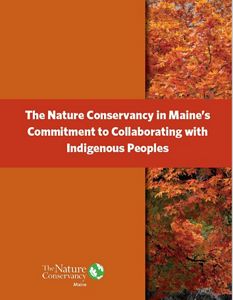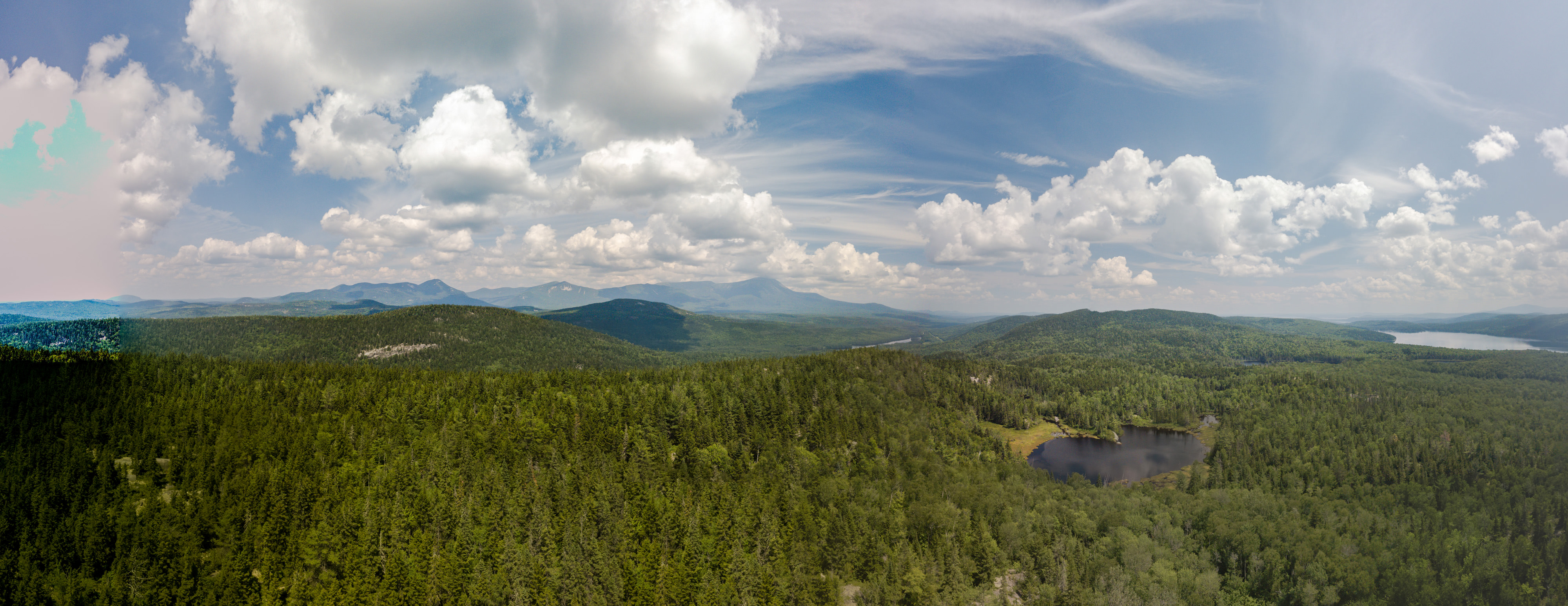Defining Equity
We are defining equity as a state in which people have equal opportunity to achieve their full potential, with no extra advantage or burden because of their identities. Because the structures and systems of power in which we operate shape that opportunity, achieving equity requires addressing those structures and systems directly.
This work must acknowledge, seek to repair, and act to prevent the negative impacts conservation can have on people—especially Indigenous, local, and communities of color—through changes in our practices, outcomes and culture.
Equity and Conservation
At The Nature Conservancy (TNC) in Maine, we have come to understand that centering equity in our work is critical to achieving TNC's vision of a world where "the diversity of life thrives." This document seeks to articulate that understanding, as well as our commitment to approaching equity not as separate from our conservation work, but as a lens through which we must consider all we do in order to achieve our mission.

Collaborating with Indigenous Peoples
TNC is committed to sustained, informed, and deliberate work with and in support of Wabanaki people. Read our full statement about this commitment or the summary document.
Conservation does not happen in a vacuum. The work of conserving natural places inevitably intersects with and affects human communities in ways that create both benefits and burdens. As conservationists and as people, it is our responsibility to understand the full range of these impacts—especially the burdens they impose on communities that have historically experienced oppression and marginalization, and still do today.
This understanding requires hearing, learning from, and incorporating diverse views and ways of knowing into our work. Just as biodiversity strengthens and animates natural systems, conservation is made stronger by a diversity of experiences, perspectives, values, and knowledge. Creating meaningful opportunity for such diversity requires increasing equity.
Our learning and commitments to action begin with racial equity. Race remains the most durable predictor of quality of life, having shaped generational health outcomes, economic conditions and opportunities, and overall wellbeing for people in Maine and around the world. By cultivating our understanding of racial equity, including how a white-dominant mindset has shaped TNC and traditional conservation priorities and decisions, we will deepen our engagement with all communities, build trusting relationships with new partners, and generate better conservation outcomes for people and nature.
Acknowledging Our History
To envision and create a more equitable future, we must acknowledge our past and how it shapes who we are today.
TNC is a predominantly white organization, operating within a broader conservation sector and a state that are also predominantly white. We acknowledge that our organization, sector, and state have been built on exclusionary systems that we have inherited and from which we have benefited. In many important ways, we continue to benefit from the privileges inherent in a white-dominant culture, including disproportionate economic, social, and political power.
In addition to benefiting from these inequitable systems, we acknowledge that our approach to conservation has sometimes served to reinforce them. Historically, the majority of TNC's work has focused on protecting nature for nature's sake, ignoring that the wellbeing of nature and people is inextricably connected, and that successful conservation must include the pursuit of just and thriving human communities. As a result, our work has sometimes caused harm to people and communities and has not included nor benefited all people as it should.
We recognize that these same systems have also contributed to the marginalization of rural communities and those living in poverty in Maine (white people and people of color alike). Over time, they have compounded health, economic, and other inequities for many in the state and beyond.
Colonialism’s multi-generational legacy of division, displacement, war, enslavement, exploitation, and genocide has done enormous harm to Maine and to the planet. This acknowledgement and understanding is crucial in order to pursue conservation that actively works to counteract these impacts, to repair, to restore, and to heal.
Affirming Our Commitment
Embarking on this learning journey has changed us as a team. We have been humbled and challenged and are growing with this work every day.
We commit to continually identifying and seizing opportunities to understand, check, surrender, share, and use our power to increase equity. This requires reconsidering our actions and initiatives through an equity lens, including but not limited to:
- Recruitment, hiring, training, and retention of staff and volunteers
- Our approach to partnering with other organizations
- Direct conservation and science efforts
- Fundraising
- Advocacy on public policy matters
- Public outreach, engagement, and storytelling
- Our plan for continuous learning
We also commit to engaging with the broader TNC organization in support of equity and ongoing learning, consistent with our Core Values. We know that success will create better outcomes for TNC and for the planet.
Outlining Our Approach
As a next step, we have identified four initial areas of focus. Each has designated staff leadership, key milestones, and an inclusive process for developing specific and actionable changes to how we operate.
- Learning: We are working to ensure our staff and Board of Trustees are supported and challenged in our continual learning on equity and its direct application to our work.
- Culture: We are working to build a team culture among our staff and board that reflects and supports our values, confronts our privilege and shifts our power (especially as a majority-white organization), and prioritizes equity, including in our approach to employee recruitment and retention.
- Science: We are working to broaden our scientific processes to include multiple ways of knowing, including Indigenous knowledge, and to better incorporate our understanding of how dominant notions of western science’s "neutrality" and "centrality" are flawed and limiting.
- Partnerships: We are working to build authentic relationships with BIPOC (Black, Indigenous, and People of Color) people and BIPOC-led groups in order to elevate their involvement and agency in conservation and climate action, as well as to help guide how we prioritize investments and improve access to protected and restored places.
These initiatives will lead to more steps on our equity learning journey. TNC's team in Maine is committed to updating this document regularly to reflect our evolving approach to building equity in our organization and in our work.
Using This Statement
These words are a result of TNC Maine's ongoing equity learning process. As each process is unique, we encourage any organization interested in repurposing any language here to begin by undertaking your own equity learning.
As we learn, we would benefit from your input. Please feel welcome to submit feedback on this document at naturemaine@tnc.org. Thank you.
